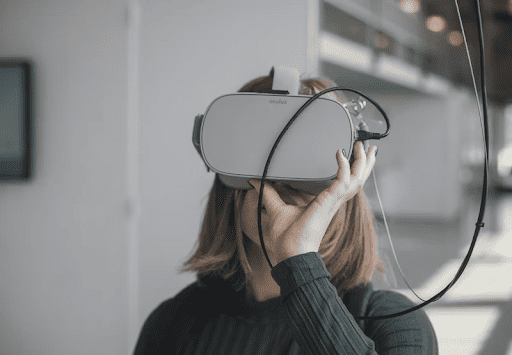Virtual Reality: No Longer Just for Gaming

Virtual Reality (VR) is often relegated as a high-tech plaything, but this perception scarcely scratches the surface. When most people think of VR, gaming is the first thing that usually comes to mind. It’s easy to understand why—this is the arena where VR made its most significant early impact.
VR in Gaming
Companies like Oculus Rift and Sony’s PlayStation VR shaped the narrative that the technology is primarily a tool for immersive gaming.
However, systems have become sophisticated enough to offer compelling, immersive experiences, shifting how we understand interactive entertainment.
The global VR gaming market was estimated to reach $28.9 billion in 2022. In the next five years, further growth is projected at a compound annual growth rate (CAGR) of 29 percent. These figures underline the massive commercial and cultural influence of VR gaming.
In the gaming world, VR allows for various experiences that traditional gaming setups can’t replicate. From first-person shooters to puzzle games, the possibilities are endless. Even within the context of larger multiplayer online games, VR creates sub-communities and experiences that are uniquely interactive.
The powerful association between VR and gaming has been both a blessing and a curse. It’s provided a commercial viability that has propelled investment and innovation in VR technology. However, the focus on gaming can sometimes overshadow VR’s potential applications.
By diversifying its applicability, VR can break free from the gaming stereotype, reaching broader user demographics and contributing to various industries.
Undeniably, the gaming industry has been instrumental in the rise of VR. Yet, as we explore the technology’s diverse applications, it becomes clear that its potential is beyond one domain.
Applications of VR Beyond Gaming
The transformative power of VR is infiltrating industries you might not have expected. Here are some applications of VR beyond gaming:
Medical training and simulation
In the realm of healthcare, VR is a game-changer. Surgeons with virtual reality training were 29 percent faster. They also made six times fewer errors than their non-VR-trained counterparts. Virtual environments allow medical professionals to practice intricate procedures without the inherent risks of live patients, altering the medical training landscape.
Mental health treatment
A study published by the American Psychiatry Association (APA) found that VR’s role in mental health is groundbreaking. The study suggests that VR exposure therapy is as effective as traditional exposure therapy for treating phobias and anxiety disorders. This offers a scalable, cost-effective treatment option that could fundamentally change our approach to mental health.
Virtual travel and exploration
Why settle for documentaries when you can explore remote locations in real-time? Schools already incorporate VR trips into their curriculums. It provides a dynamic learning experience, bringing education out of textbooks and into lived experience.
VR can also be a potent tool for government agencies and destination marketing organizations. They can create virtual settings to pilot new initiatives, policies, and promotional strategies before fully launching them. Additionally, they can help manage visitor traffic to overcrowded spots by offering alternative virtual experiences.
These virtual landscapes open new business avenues for tourism providers, especially during challenging economic periods, and cater to niche customer segments. They also make travel experiences accessible to individuals who might not otherwise have the means or capability to visit, such as low-income individuals, people with disabilities, or older adults.
Furthermore, virtual tourism can sustain people’s desire for travel in times of crisis or outbreaks, adding a layer of resilience to the industry.
Real estate and architecture
The real estate industry has been quick to adopt virtual reality. Property listings with a 3D walkthrough receive more qualified leads than those without. These virtual tours save the realtor and potential buyers time, making buying more efficient.
Corporate training
The corporate world is not lagging behind when it comes to embracing VR. VR learners are up to four times more focused than their e-learning peers. This means higher retention rates and a more competent workforce.
VR is incredibly impactful for training in customer service roles. Imagine an employee navigating a customer through directory assistance services in a fully immersive VR environment. This small detail epitomizes how VR can add layers of realism to traditional corporate training methods.
Navigating the Ethical Dimensions
As VR technology evolves, the ethical landscape surrounding its usage becomes increasingly complex.
The immersive nature of VR often requires capturing detailed user data, ranging from movements to voice and even biometric indicators. Such a wealth of information poses significant privacy concerns. It’s about data collection and how it’s stored, shared, and potentially exploited. Therefore, robust data encryption and transparent privacy policies become imperative to protect user information.
It can also have far-reaching implications for psychological well-being. For some users, the line between the virtual and real world may blur, leading to disorientation or loss of touch with reality.
The potential for misuse is another ethical concern that cannot be ignored. VR could be used to promote hate speech, enable cyberbullying, or even facilitate illegal activities. Creating realistic simulations that manipulate people emotionally or politically is also possible.
Given these considerations, there’s an urgent need for comprehensive ethical guidelines that govern the use of VR technology. These guidelines should be universally applicable and flexible enough to adapt to the rapid advancements in VR technology.
Ready to embrace the virtual frontier?
Undeniably, the gaming industry has been instrumental in the rise of VR. Yet, as we explore the technology’s diverse applications, it becomes clear that its potential is not confined to any single domain.
It’s abundantly clear that virtual reality offers much more than immersive gaming experiences.
The future of VR is rich and varied, promising transformative changes across sectors. It’s no longer the future but the here and now. Pigeonholing VR as a gaming-only tool is not just short-sighted—it’s a disservice to its remarkable versatility.





